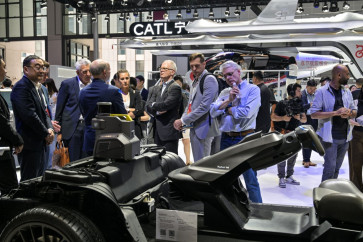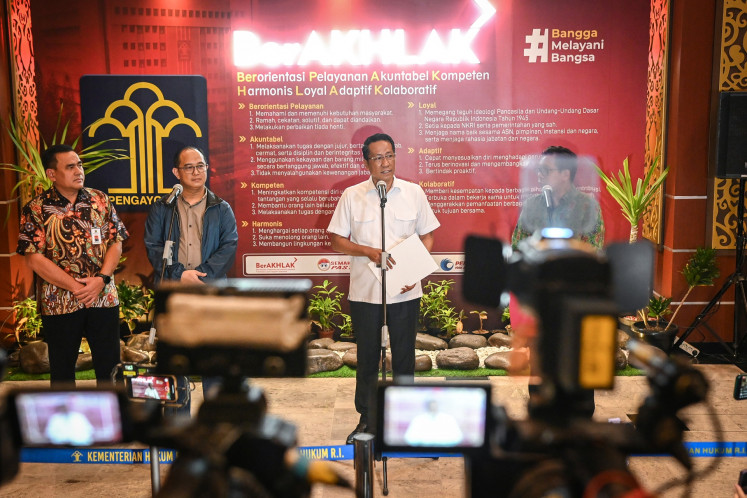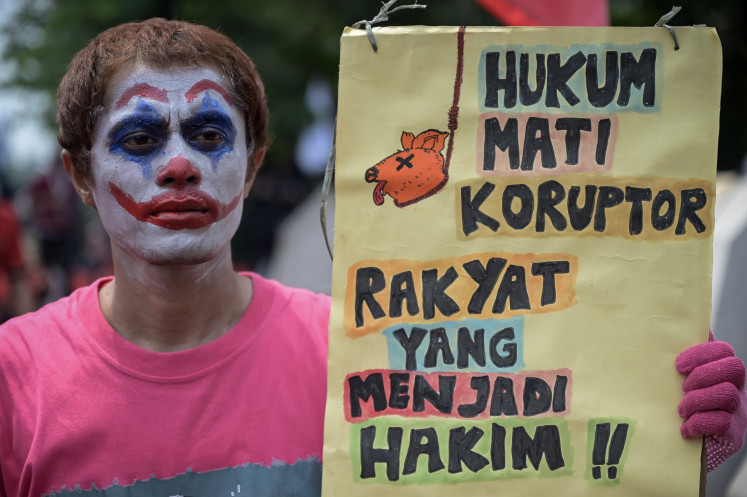Popular Reads
Top Results
Can't find what you're looking for?
View all search resultsPopular Reads
Top Results
Can't find what you're looking for?
View all search resultsIslamic reform and independence
In 1930, Shaykh Muhammad Bashuni, a prominent cleric in in Sambas, West Kalimantan, wrote to al-Manar magazine in Egypt on two important questions
Change text size
Gift Premium Articles
to Anyone
I
n 1930, Shaykh Muhammad Bashuni, a prominent cleric in in Sambas, West Kalimantan, wrote to al-Manar magazine in Egypt on two important questions.
First, why are the Muslims, especially those in the Malay world, in a state of weakness and decline? Second, why are non-Muslim nations advanced, and is it possible for Muslims to emulate their model of advancement without compromising their religious principles?
In response, Shakib Arslan, an Egyptian reformist wrote a series of articles, which were later published as a book entitled Limaaza ta’akhkhara al-Muslimun wa taqaddama gairuhum (Why are the Muslims backward and why are other believers advanced?).
The questions were also discussed in al-Imam magazine, a reformist publication that has been published in Singapore since 1906. It even came up with some sharp self-criticism (or self-consciousness) conferring Muslims’ backwardness, their domination by foreign powers, ignorance of modern knowledge, laziness, complacency, conflicts and lack of cooperation among themselves.
To Indonesia, nearly every struggle for independence conducted by Indonesian Muslims was then inspired by a consciousness that they had been colonized for a long time because of illiteracy and lack of modern science and technology.
They needed enlightenment through modern schooling and universities. They were aware there should be intensive learning of knowledge other than just of traditional religious disciplines.
The ethical policy introduced by the colonial Dutch at the beginning of the 20th century in Indonesia thus made the wish more possible despite its limitedness. The national awakening was then machined by intellectuals with a Middle East educational background and also by the ones with modern European credentials.
Indonesian independence was reached by the endeavors of those diverse but “factually” united intellectuals in 1945. And we clearly see in history that sound intellectual minds defeated shallow sectarian thought proposed by certain Muslim leaders at that time, which were based on an incomprehensive understanding of Islamic teachings.
More than a century after the monumental Muslim awakening, the question “Why are the Muslims backward and why are other believers advanced?” sounds somehow relevant to today’s Indonesian Muslims, not only on behalf of themselves but also on the continuity of plural Indonesia, which is contemporarily hampered by particular issues to change the relatively harmonious Muslims relationship with the others.
Looking deeply at the Muslim community, many of them have actually been advanced in matters of education or the economics.
Plenty have acquired science and technology, and studied at the best universities in the world. But, to our sadness, apart from the “enlightened ones”, more than hundreds of millions of Muslims have been left behind and are impoverished. They seem to be abandoned by the intellectualized ones.
Simply said, the fortunate Muslims fail to serve as the dream locomotive, which will pull the wagons with more than 100 million passengers on board.
The circumstances are surely never positive for any party. With the incapability to undertake massive changes, middle-class Muslims can only be on the other side of the same coin. While the less-fortuned Muslims become a societal burden in terms of economy or social problems, the fortuned ones can potentially be the engineers and donors of incessant conflicts.
Inter-religious issues with this societal pattern, for example, have always been a diehard to cope with, such as those in some Islamic countries in the Middle East.
That is why an Islamic reform, particularly in relation to the upcoming Indonesian Independence Day, should be something to think about. It can be the proper momentum when we, at least, remind ourselves, that there is always the possibility to endorse a change in Islamic society as occurred in the beginning of the 20th century.
In a more practical sense, we actually cannot wait for the reformist middle class of Muslims to touch the earth in their effort to reform their society.
Beside being conscious of how the pro-violent radical thoughts should be abolished, the reformists must act more properly among the mainstream Muslims. They should, for example, avoid using offensive measures that will only seed antipathy instead of sympathy. Their voices should become something, not disappear into thin air.
On the other side, the romanticist Muslims, who are peculiarly tied to the middle-age and Middle East Islam, should stop dreaming and learn the facts of today’s Muslims’ circumstances. They need to criticize themselves, and at the same time positively think about others and the goodness modernity promises.
As shown in some research, this typical Muslim middle class is potentially supporting radical violent practices among Muslims, not only because of their capabilities in terms of economy and skills, but also their shared and intellectualized ideological sentiments that radical Muslims from lower classes do not.
Consequently, the effects they may instigate are far more perilous than the ones with merely roots in poverty and illiteracy.
That is why, in welcoming this anniversary of Indonesia’s independence, endorsement of Islamic reform should be made by both Muslims and non-Muslims, simply because its urgency is now commonly recognized: To the truer independent days, merdeka (freedom)!
The writer is a researcher at Paramadina Foundation.










